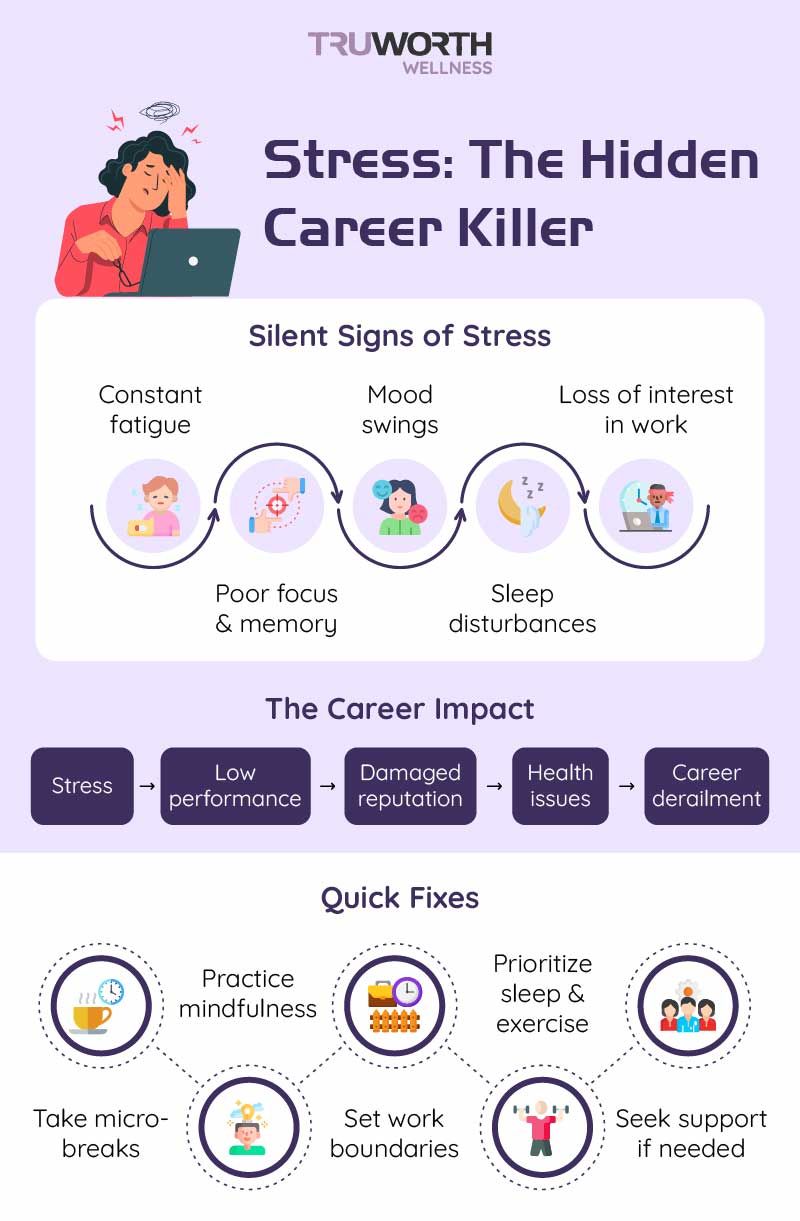This One Hidden Risk Factor Can Destroy Your Corporate Life

Climbing the corporate ladder isn’t instantaneous—most professionals invest countless years in securing and growing their careers. You invest in upskilling, networking, delivering projects, and establishing a reputation. Yet, there’s one silent risk factor that can wipe it all away—not lack of knowledge, not workplace politics, and not even poor performance.
That hidden factor is chronic stress.
Unlike other career obstacles, stress doesn’t make its presence immediately obvious. It creeps in quietly, disguising itself as long working hours, constant multitasking, or that “always-on” corporate hustle. Over time, it doesn’t just affect how you feel—it affects how you perform, how others perceive you, and ultimately, how long your career lasts.
Also Read: 3 Overlooked Ways Employers Can Reduce Stress In The Workplace

Why Stress Is the Silent Career Killer?
Many professionals accept stress as a “normal” part of corporate life. Phrases like “It comes with the job” or “I’ll rest after this deadline” are normalized to the point where we ignore warning signs. But the truth is, stress is not just an emotional burden—it has physical, psychological, and professional consequences.
Some early indicators of unmanaged stress include:
- Frequent irritability or mood swings
- Difficulty concentrating or remembering details
- Restless sleep or insomnia
- Constant fatigue despite rest
- Growing impatience with colleagues or family
The danger is not the stress itself, but our tendency to ignore these red flags until they evolve into full-blown burnout, health breakdowns, or career stagnation.
Also Check: 7 Ways Of Being Stress Free At The Workplace
The Domino Effect: How Stress Derails Careers?
The impact of unmanaged stress extends far beyond feeling tired. It sets off a chain reaction that affects performance, health, and relationships—often leading to stalled growth or even an unexpected career exit.
1) Declining Productivity and Performance
Prolonged stress impairs focus, creativity, and decision-making. Small mistakes begin piling up, deadlines get missed, and quality suffers.
2) Damaged Professional Reputation
Colleagues and managers may perceive a stressed employee as distracted, negative, or unreliable—damaging years of hard work in building credibility.
3) Strained Relationships
Stress makes people less patient, less communicative, and more prone to conflicts. This erodes teamwork and collaboration, both critical for corporate success.
4) Health Complications
Chronic stress is linked to hypertension, diabetes, cardiovascular diseases, digestive issues, and anxiety disorders. Extended health breaks can disrupt career continuity.
5) Career Stagnation or Exit
Eventually, severe burnout can force professionals to step back, change careers abruptly, or take unplanned sabbaticals—undoing years of progress.
Real-world example: Many high-potential employees in leadership pipelines drop out not because they lacked skill but because stress overwhelmed them before they could step into bigger roles.
How to Spot Stress Before It’s Too Late?
Awareness is the first line of defense. Ask yourself:
- Am I constantly working but still feeling “behind”?
- Do I carry work-related anxiety into weekends and family time?
- Is my sleep or appetite noticeably disturbed?
- Have colleagues or loved ones mentioned that I seem more irritable?
- Do I no longer enjoy projects I used to find exciting?
If several of these resonate, stress may already be affecting your professional trajectory.
Must Read: How Proper Breathwork Can Reduce Stress And Improve Focus?
Practical Ways to Protect Your Career From Stress
1. Build Emotional Fitness
Just as physical fitness prevents illness, emotional resilience helps you bounce back from setbacks. Techniques like mindfulness meditation, journaling, and even short gratitude practices can significantly reduce the psychological load of stress.
2. Take Micro-Breaks
You don’t need hour-long vacations daily. Short breaks every 90 minutes—walking, stretching, or even closing your eyes for 3 minutes—help reset your nervous system and sustain focus.
3. Redefine Boundaries
Work-life balance isn’t about doing less work; it’s about working smart. Setting defined work hours, learning to say no, and reducing after-hours emails can help you reclaim energy.
4. Strengthen Lifestyle Foundations
Prioritize consistent sleep, balanced nutrition, regular physical activity, and limited screen time. These basic habits are the foundation of long-term stress resilience.
5. Seek Support
Talking to mentors, HR, or accessing Employee Assistance Programs (EAPs) can provide both emotional relief and practical solutions. Seeking help is a sign of strength, not weakness.
What Leaders and Organizations Can Do?
Stress is not only an individual issue; it’s also organizational. A culture that glorifies long hours and “always available” employees fuels chronic stress across the workforce.
Leaders and HR teams can help by:
- Encouraging open conversations around mental health without stigma
- Implementing flexible work models where possible
- Recognizing output over hours worked
- Investing in wellness initiatives like counseling, resilience workshops, or guided meditation programs
- Training managers to spot early signs of burnout among their teams
When leaders model healthy boundaries and prioritize wellbeing, employees feel empowered to do the same—reducing stress culture across the board.
Final Thoughts
The biggest threat to your career is not an incompetent boss, missed opportunity, or even competition—it’s unchecked stress. This silent risk factor has the power to derail performance, tarnish professional relationships, and push talented individuals out of their career paths prematurely.
But the good news is: stress can be managed. By recognizing the signs early, making conscious lifestyle changes, and leveraging workplace wellness resources, you can safeguard your career and thrive—without burning out.
At Truworth Wellness, we believe that career success and employee wellbeing go hand in hand. Our customized corporate wellness programs help professionals build resilience, manage stress, and stay at the top of their game. Because when employees are well, organizations excel.